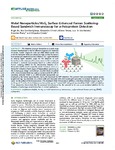Metal Nanoparticles/MoS2 Surface-Enhanced Raman Scattering- Based Sandwich Immunoassay for α‑Fetoprotein Detection

Use este enlace para citar
http://hdl.handle.net/2183/37422Coleccións
- Investigación (FCIE) [1227]
Metadatos
Mostrar o rexistro completo do ítemTítulo
Metal Nanoparticles/MoS2 Surface-Enhanced Raman Scattering- Based Sandwich Immunoassay for α‑Fetoprotein DetectionAutor(es)
Data
2021-02-13Cita bibliográfica
ACS Appl. Mater. Interfaces 2021, 13, 7, 8823–8831
Resumo
[Abstract]: The detection of cancer biomarkers at an early stage of tumor development is vital for effective diagnosis and treatment of cancer. Current diagnostic tools can often detect cancer only when the biomarker levels are already too high, so that the tumors have spread and treatments are less effective. It is urgent therefore to develop highly sensitive assays for the detection of such biomarkers at the lowest possible concentration. In this context, we developed a sandwich immunoassay based on surface-enhanced Raman scattering (SERS) for the ultrasensitive detection of α-fetoprotein (AFP), which is typically present in human serum as a biomarker indicative of early stages of hepatocellular carcinoma. In the immunoassay design, molybdenum disulfide (MoS2) modified with a monoclonal antibody was used as a capture probe for AFP. A secondary antibody linked to an SERS-encoded nanoparticle was employed as the Raman signal reporter, that is, the transducer for AFP detection. The sandwich immunocomplex “capture probe/target/SERS tag” was deposited on a silicon wafer and decorated with silver-coated gold nanocubes to increase the density of “hot spots” on the surface of the immunosensor. The developed SERS immunosensor exhibits a wide linear detection range (1 pg mL–1 to 10 ng mL–1) with a limit of detection as low as 0.03 pg mL–1 toward AFP with good reproducibility (RSD < 6%) and stability. These parameters demonstrate that the proposed immunosensor has the potential to be used as an analytical platform for the detection of early-stage cancer biomarkers in clinical applications.
Palabras chave
Molybdenum disulfide
Au−Ag core−shell nanostructures
Immunosensor
Surface-enhanced Raman scattering (SERS)
α-fetoprotein
Au−Ag core−shell nanostructures
Immunosensor
Surface-enhanced Raman scattering (SERS)
α-fetoprotein
Versión do editor
Dereitos
Copyright © 2021 The Authors. Published by American Chemical Society. This publication is licensed under CC-BY-NC-ND 4.0 (https://creativecommons.org/licenses/by-nc-nd/4.0/)
ISSN
1944-8244
1944-8252 (E-ISSN)
1944-8252 (E-ISSN)





